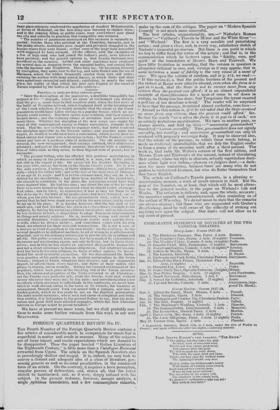FOREIGN QUARTERLY REVIEW No. IV.
THE Fourth Number of the Foreign Quarterly Review contains a few articles of considerable merit, to compensate for much that is superficial in matter and crude in manner. Many of the subjects are of large import, and excite expectations which are doomed to be disappointed. Thus the paper headed "Italian Literature of the Eighteenth Century," is little more than a Catalogue Raisonne extracted from Ugoni. The article on the Spanish Novelists also is provokingly shallow and insipid. It is, indeed, no easy task to convey a distinct and adequate idea of a class of literature, pos- sessing generic as well as national peculiarities, in the condensed form of an article. On the contrary, it requires a keen perception, singular powers of delineation, and, above all, that the writer should be familiarized, and, as it were, deeply imbued with his subject. In the present instance, however, meagre analysis, a single Ispiritless translation, and a few commonplace remarks, make up the sum.of the critique. The paper on "Modern Spanish Comedy" is not much more successful. The best articles, unquestionably, are,—" Niebuhr's Roman History"—" Cailliand's Travels to Meroe and the White and "Wieland." The first is a very sensible and' painstaking notice ; and gives a clear, and, in every way, satisfactory sketch of Niebuhr's immortal production. But there is one point in which we beg to differ from the writer of the article ; and that is, in the commendation which he bestows .upon the "fidelity, ease, and spirit" of the translation of Messrs. Hare and Thirlwall. We have little hesitation in asserting, that the version in question is altogether deficient in ease, and, strange as it may appear, that in some instances a want of fidelity is the very cause of a want of ease. We open the volume at random, and at p. 412, we read:— " If this notion (i. e. that the public burdens of the poorest and the richest at Rome were alike) is absurd, even when the form it is - put in is such, that the State is not to receive more from any citizen than the poorest can ebrd ; it is an almost unparalleled example of thoughtlessness for a man of sense to set down in writing., as Dionysius has done, that Tarquinius the tyrant exacted a poll-tax of ten drachms a-head." The reader will be surprised to hear that the passage, translated almost verbatim, runs thus :— "Absurd as this notion is, i/it be intended that the State received no more from any citizen, than the poorest could affbrd," &c. So that the words "earn when the form it is put in is such," are an entirely gratuitous mystification. We turn to another page, as cleince directs, and find (p. 555) — "souveraine gesammtheit" translated "SOVJW72 assembly." Now, gesammtheit does not signify assembiy, but totality ; and souveraine gesammtheit can only be rendered with propriety sovereign body. It may be observed also, that the whole of the passage, to which these words belong, is .• made so studiously unintelligible, that we defy the English reader to form a guess at its meaning until after a third perusal. The truth is, that both Mr. Walter's version of the first edition, and Messrs. Hare and Thirlwall's of the second, instead of elucidating ' their author, where his style is obscure, actually superinduce dark- ness where light was before,—fumain ex fulgore dant ;—a dark- ness the more tantalizing, because there are many who do not profess to understand German, but who do flatter themselves that they know English. The article on Cailliaud's Travels presents, in a pleasing at unpretendin,, manner, a work of much interest in itself. But the. gem of lime Number, or, at least, that which will be most attrac- tive to the general reader, is the paper on Wieland's Life and Works. The criticism is delicate, and, upon the whole, accurate ; the narrative smooth and unembarrassed, often reminding us of the author of Waverley. We do not mean to state that the remarks are always original ; but those who are acquainted with Gruber's Beurbeitung, must be well aware of the difficulty of striking out anything new upon the subject. Our limits will not allow us to say more at present.
























 Previous page
Previous page